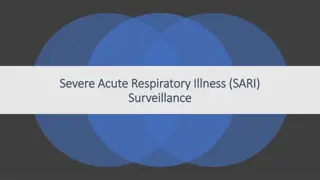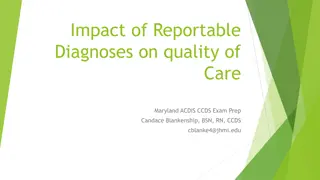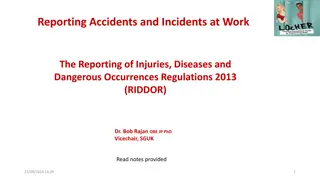
Reportable Cases Guidelines and Criteria
Learn about the criteria for reportable cases, including instances of violence, accidents, suicides, drug overdoses, deaths related to pregnancy complications, occupational deaths, undetermined causes, and more. Understand when deaths require further investigation and the roles of supervised institutes and healthcare facilities in reporting deaths.
Download Presentation

Please find below an Image/Link to download the presentation.
The content on the website is provided AS IS for your information and personal use only. It may not be sold, licensed, or shared on other websites without obtaining consent from the author. If you encounter any issues during the download, it is possible that the publisher has removed the file from their server.
You are allowed to download the files provided on this website for personal or commercial use, subject to the condition that they are used lawfully. All files are the property of their respective owners.
The content on the website is provided AS IS for your information and personal use only. It may not be sold, licensed, or shared on other websites without obtaining consent from the author.
E N D
Presentation Transcript
Reportable cases: Theeb Alkahtani
Reportable cases: 1) Any violence. 2) Suddenly and or unexpectedly. 3) All accidents (falls, motor vehicles, industrial). 4) All suicides.
5) All suspected drug overdose or chemical or poisoning. 6) Death of mother or offspring during, due to or of complications of pregnancy (ex. pregnant women who have Eclampsia and died because of that).
7) Deaths related to employment, occupation or industry. 8) All possible threats to public health. 9)Where the person was not under the care of a physician (needs to be referred so that the physician would write the death certificate).
10) Where the cause of death is undetermined (it's the origin of every other reportable cases ). 11) As the result of improper or suspected negligent treatment by a person; misconduct or malpractice.
12) The person died in a place or under circumstances requiring an inquest under any statute; violence, misadventure, negligence, misconduct, or malpractice.
13) If the person died in any supervised institute " Deaths that occur in any institute that an agency supervises another person ", (ex. retirement homes, nursing homes, mental institutes, prisons, orphanages, military).
14) Medical cases where a person dies while in a health care facility or another place where patients are received for treatment or care and there is reason to believe that:
-The death occurred as the result of violence, attempted suicide or accident. -The death occurred as a result of suspected misadventure, negligence or accident on the part of the attending physician or staff. -The cause of death is undetermined. -The death occurred within 10 days of an operative or therapeutic procedure or the patient is under initial induction, under anaesthesia or during the recovery from anaesthesia, or who dies within 6 months of sustaining a fracture -Due to complications of an operative or therapeutic procedure at any time. -A person is declared dead on arrival or dies in the ER of a health care facility. -Within 24 hours after admission to such hospital.
* Misdiagnosis cases: A 2009 meta-analysis of 62 studies identified the 5 most commonly mis-diagnosed diseases as: infection, neoplasm, myocardial infarction, pulmonary emboli, and cardiovascular disease. A study which compares post-mortem diagnosis with ante- mortem diagnosis revealed that the most common mis- diagnosed diseases are: infection, neoplasm, myocardial infarction, pulmonary emboli, and cardiovascular disease. >> meta-analysis: combines the results of several studies that address a set of related research hypotheses.






















